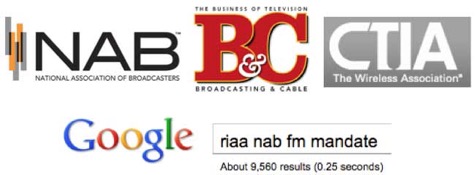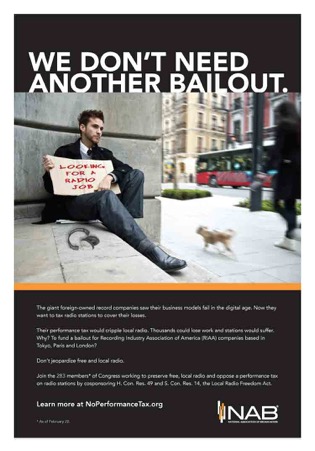Sounds of Silence

As shown above, Google can find lots of information about the “wacky idea” of NAB and RIAA to mandate FM receivers in cell phones and certain other personal electronics to help settle their music royalty dispute. I’m sure most Americans would be glad to pay extra to carry around something they don’t want and makes their cell phone bulkier in order for these trade associations to kiss and make up. Most Americans feel trade association comity is a key issue and would be glad to help out.
Oddly, three usually very talkative entities, shown above, are strangely silent on the issue. CTIA is reported to be against the proposal, but their website is silent. Broadcasting & Cable, the broadcasting industry’s cheerleader - masquerading as journalism - is also devoid of information.
Finally, coconspirator NAB is also strangely silent on the issue of FM receivers, although they have a page on the “Performance Tax” issue that lead to the bizarre deal with RIAA. The ad at left was part of NAB’s campaign on this issue. Glad to know that they don’t “need a bailout” from the government. An unnecessary mandate on consumers would be adequate to appease NAB.
NAB’s website discussion ends with this:
Action Needed
Congress should oppose a congressionally mandated performance tax on free, local radio broadcasters that would jeopardize local jobs, prevent new artists from breaking into the recording business and harm the 239 million Americans who rely on local radio.
Doesn’t mention that FM receivers in cell phones are part of the solution. Maybe the news of the deal leaked before the NAB spin doctors could tidy up their website.
We will be glad to print or link NAB’s explanation when they figure it out. I am sure B&C will echo it as soon as they get their marching orders from 1771 N Street NW.
CTIA’s silence is more puzzling. Perhaps they are trying to negotiate and don’t want to be as confrontational as CEA.
UPDATE 1
While writing this I tried to call NAB for an opinion/statement, but just got routed from one person to another. However, an e-mail inquiry produced
following quote from NAB Executive Vice President of Communications Dennis Wharton.
"We think that from a public safety perspective, it is critically important to have broadcast radio’s unparalleled lifeline service available instantaneously in times of emergency. For that reason, NAB would oppose any legislation related to royalties that did not include that feature.”
On background, a few things to keep in mind:
-- Radio is a reliable, free and local lifeline service in times of crisis, and in a society where cell phones and other mobile devices are increasingly ubiquitous, it makes sense to have radio-enabled chips in these devices from a public safety perspective; Not to get too dramatic about this, but there were photos that I wish I’d saved from the NY Times on 9/11 of people huddled around car radios and boomboxes to get the latest information;
-- When mass-produced, this feature would cost pennies per cellphone;
-- Many cellphones already have radio capability. They have just not been activated yet by the manufacturer;
-- “Tagging” of music is a feature that many consumers would enjoy, possible providing a new revenue stream to cellphone providers, record labels and radio stations;
-- Putting an FM chip in a cellphone frees up network capacity for the cellphone provider that was previously employed by the consumer for streaming audio features like Pandora and iHeartRadio.You might also be interested in the attached letter, sent last November, by 60 U.S. House representatives from both sides of the aisle to FCC Chairman Julius Genachowski and Secretary of Homeland Security Janet Napolitano. The letter advocates that FM radio capability be added to all mobile phones sold in the United States, citing safety and emergency warning alert concerns. (See attached)
NAB’s Wharton told the Washington Post’s Rob Pegoraro in an e-mail:
From a public safety perspective, it is critically important to have broadcast radio's unparalleled lifeline service available instantaneously in times of emergency. For that reason, NAB would oppose any legislation related to royalties that did not include that feature.
Pegoraro commented in the Post:
Somehow, the broadcasters did not think to make such a request earlier, even though an entire generation of Americans has grown up thinking "phone" means "mobile phone." So either the NAB has only recently begun to put a higher value on human life, or it thinks spending other people's money--that of phone manufacturers, the carriers who sell their products and their customers--will sell this proposal to its members.
Kristopher M. Jones, NAB Vice President, Media Relations added “One last thing: The assertion that radio is a "horse and buggy" dying technology is belied by Arbitron, which recently reported that the number of over-the-air radio listeners per week is now at an all-time high, at 239 million. That’s up 7 million in just the last year. http://arbitron.mediaroom.com/index.php?s=43&item=693 “
NAB: The “November” letter, actually September 2009, got no attention in the broadcasting press, not even it its lapdog Broadcasting & Cable. If FM broadcasting is doing so well, why do we need this mandate? Chmn. Genachowski has responded to the Congressmen who sent the letter saying that the issue will be folded into an ongoing docket on Commercial Mobile Alert System, Docket 07-287. He also stated,
“As you may be aware, on April 9, 2008, the Commission released its First Report and Order adopting technologically neutral rules for the CMAS. In that Order, the Commission considered the comments filed by supporters of FM-based emergency alert technologies, and ultimately concluded that it would "not require or prohibit the use of ALERT-FM ... or similar systems as the basis of the CMAS." CMAS participants, then, are free to adopt FM-based technologies as they desire.”
So, NAB, why do we need legislation at this moment? What is wrong with the current technological neutrality? What does RIAA and “performance tax” have to do with this? What relationship does royalty legislation have with public safety? Isn’t this just a bailout - the thing you decried in your ad?
I was hoping to listen in in the 8/23 NAB “virtual town hall” on radio issues, but sadly they have now closed it to nonmembers.
UPDATE 2 8/24
NAB finally broke its silence on its website with the following item:
NAB Statement on CTIA's Anti-Radio Letter to Lawmakers
The National Association of Broadcasters issued a statement today in response to a letter sent by several wireless industry representatives to the Chairmen and Ranking Members of the House and Senate Judiciary Committees. The groups expressed their opposition to the adoption of a radio receiver in cell phones.
Commenting on the letter, NAB Executive Vice President of Communications Dennis Wharton issued the following statement:
"Countries around the globe have added radio-enabled cell phones that are increasingly popular with consumers. The reality is that 239 million Americans tune in to free and local radio every week, and seven million new radio listeners were added just last year.
"Day in and day out, local radio stations serve as a reliable lifeline in times of crisis and weather emergencies. In an increasingly mobile society, it would be unfortunate if telco gatekeepers blocked access to public safety information offered by free and local radio."
The National Association of Broadcasters issued a statement today in response to a letter sent by several wireless industry representatives to the Chairmen and Ranking Members of the House and Senate Judiciary Committees. The groups expressed their opposition to the adoption of a radio receiver in cell phones.
Commenting on the letter, NAB Executive Vice President of Communications Dennis Wharton issued the following statement:
"Countries around the globe have added radio-enabled cell phones that are increasingly popular with consumers. The reality is that 239 million Americans tune in to free and local radio every week, and seven million new radio listeners were added just last year.
"Day in and day out, local radio stations serve as a reliable lifeline in times of crisis and weather emergencies. In an increasingly mobile society, it would be unfortunate if telco gatekeepers blocked access to public safety information offered by free and local radio."
(NAB was not specific as to which “anti-radio” letter they were so upset about. Absent a more specific citation, it appears to be this one.)
Also newsworthy is a post on the Public Knowledge site that starts:
There’s an absolutely ridiculous story making the rounds—apparently the NAB and the RIAA have come to an agreement whereby the NAB will support broadcasters paying performance royalties, in exchange for the RIAA supporting a legal requirement that cell phones, mp3 players, and the like have FM receivers built in.
This idea is so bad that it practically debunks itself—see discussion here, here, and here—but it should suffice to say that it would probably be cheaper to buy every man, woman and child in these United States a portable transistor radio, than to wastefully redesign every high-tech gadget so that it supports an obsolete technology nobody wants. Better yet, let’s auction off the FM spectrum and use the proceeds to buy everyone a pony. ...
The NAB isn’t exactly known for its consistent policy positions (see, for example, its fierce opposition to the XM/Sirius merger (non-NAB members, coincidentally), and its support for every other media merger ever), but blackmailing the RIAA into supporting such a laughably stupid idea as requiring that cell phones include FM tuners is a new low.




![Validate my RSS feed [Valid RSS]](valid-rss-rogers.png)

